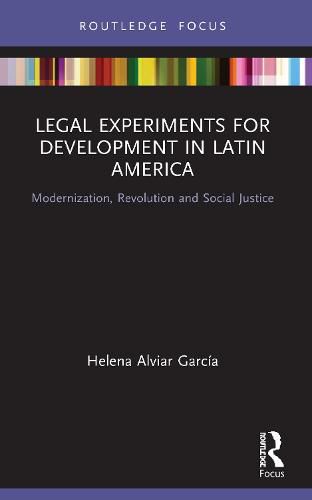Readings Newsletter
Become a Readings Member to make your shopping experience even easier.
Sign in or sign up for free!
You’re not far away from qualifying for FREE standard shipping within Australia
You’ve qualified for FREE standard shipping within Australia
The cart is loading…






This book provides a nuanced picture of how diverse legal debates on the pursuit of economic development and modernization have played out in Latin America since independence.
The opposing concepts of modernization theory and Dependency Theory can be seen to be playing out within the field of legal transformation, as some legal analysts define law as a closed, formal, rational system, and others see law as inseparable from economic, social and political change. Legal experiments have followed these trends, in some cases using legal instruments to guarantee classical, civil and political rights, and in others demanding radical transformation of existing legal structures. This book traces these debates across the key topics of: economic development and foreign investment; property; resource and power distribution in terms of gender and social policy. Drawing on a wide range of literature, the book adds complexity and color to our understanding of these themes in Latin America.
This insightful exploration of comparative law within Latin America provides the tools needed to understand legal transformation in the region, and as such will be of interest to researchers within law, political sociology, development and Latin American studies.
$9.00 standard shipping within Australia
FREE standard shipping within Australia for orders over $100.00
Express & International shipping calculated at checkout
This book provides a nuanced picture of how diverse legal debates on the pursuit of economic development and modernization have played out in Latin America since independence.
The opposing concepts of modernization theory and Dependency Theory can be seen to be playing out within the field of legal transformation, as some legal analysts define law as a closed, formal, rational system, and others see law as inseparable from economic, social and political change. Legal experiments have followed these trends, in some cases using legal instruments to guarantee classical, civil and political rights, and in others demanding radical transformation of existing legal structures. This book traces these debates across the key topics of: economic development and foreign investment; property; resource and power distribution in terms of gender and social policy. Drawing on a wide range of literature, the book adds complexity and color to our understanding of these themes in Latin America.
This insightful exploration of comparative law within Latin America provides the tools needed to understand legal transformation in the region, and as such will be of interest to researchers within law, political sociology, development and Latin American studies.